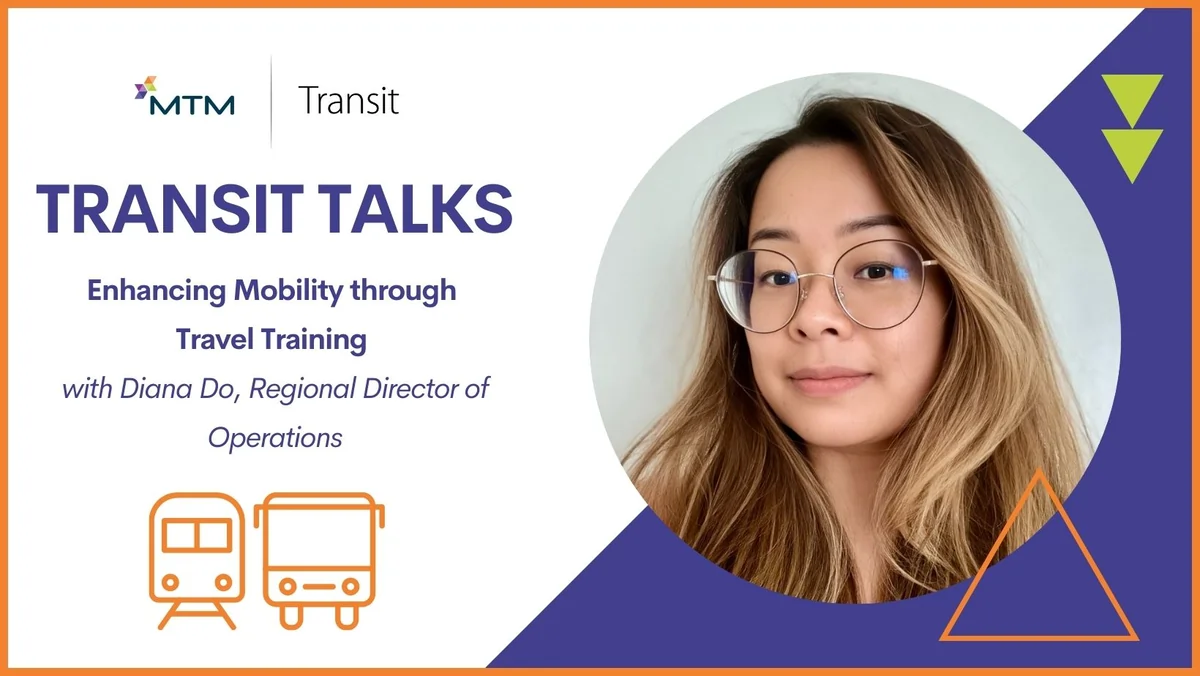Welcome back to our quarterly Transit Talks series, where MTM Transit leaders share their insights on key industry trends. This quarter, Regional Director of Operations Diana Do spotlights our travel training program—a transformative initiative that helps public transit passengers nationwide gain independence and confidence while navigating public transit.
Why Travel Training Matters
Public transportation is a vital lifeline for many, yet it can feel overwhelming for those unfamiliar with local transit systems. MTM Transit’s travel training program bridges this gap, equipping individuals—including seniors and people with disabilities—with the skills they need to safely and independently use fixed-route buses and rail systems.
Through hands-on instruction and real-world scenarios, our expert trainers guide participants in mastering essential transit skills, such as reading schedules, planning trips, and understanding fare payments. The goal? To empower riders with confidence and autonomy, reducing reliance on Americans with Disabilities Act (ADA) paratransit services and fostering more inclusive communities.
Building Independence
MTM Transit’s travel training program is built on three core principles: independence, accessibility, and efficiency. Training covers essential topics such as:
- Safety awareness and street-crossing techniques
- Reading system maps and schedules for trip planning
- Boarding, exiting, and transferring between transit modes
- Fare payment procedures and accessibility features
- Self-advocacy skills for interacting with drivers and fellow passengers
- Emergency preparedness and stranger awareness
- First and last-mile mobility options to complete trips
By developing these skills, participants gain access to employment, education, healthcare, and social activities—without relying on specialized transportation services. In turn, transit agencies benefit from reduced paratransit demand, optimizing resources for the broader community.
Making Fixed Route Transit More Accessible
MTM Transit offers customized travel training through:
- One-on-one instruction for individualized support
- Group sessions to build confidence in a supportive setting
- Classroom-based learning to reinforce key concepts
Through real-life transit scenarios, participants gradually transition from paratransit to fixed-route services, gaining greater flexibility, independence, and social integration. For transit agencies, this shift translates to significant cost savings and improved system efficiency.
Success Story: How Travel Training Changed Everett’s Life
When Everett moved to St. Louis, he was eager to explore his new city—but he wasn’t sure how to navigate public transportation. Through MTM Transit’s partnership with St. Louis Metro and Bi-State Development, Everett received personalized travel training tailored to his needs.
With the help of tactile maps and one-on-one guidance, he learned to confidently use MetroBus and MetroLink, unlocking newfound independence and mobility. Today, Everett enjoys the freedom to travel on his own terms—thanks to travel training.
This initiative is part of our broader efforts in St. Louis, where our team conducts approximately 3,700 eligibility assessments and 150 travel training sessions annually.
Why MTM Transit Leads the Way in Travel Training
With over 100,000 eligibility assessments and 1,900+ travel training sessions conducted annually across 15 programs nationwide, MTM Transit is a leader in mobility management.
Our individualized approach sets us apart. Through in-person assessments, we evaluate functional and cognitive abilities to determine the best transit options for each rider. This ensures that every participant receives the right level of support—promoting greater independence while optimizing transit resources.
The Long-Term Impact
The benefits of travel training extend far beyond individual riders:
- Increased ridership on fixed-route transit, reducing demand for costly paratransit
- Improved transit system efficiency, maximizing resources for all passengers
- Greater community participation, enhancing employment and social opportunities
- Enhanced safety and self-sufficiency, empowering individuals to travel with confidence
Studies show that travel training improves functional skills, fosters independence, and enhances vocational readiness—key factors in building a more connected, inclusive society.


